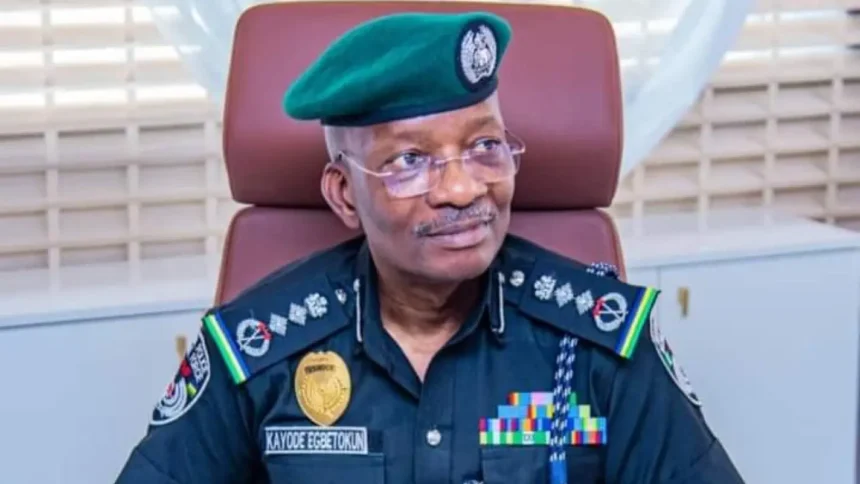The Tragic Tanker Explosion at Dikko Junction: A Wake-Up Call for Road Safety in Nigeria
On Saturday, a horrific tanker explosion at Dikko Junction along the Abuja-Kaduna Expressway in Niger State sent shockwaves through the nation, claiming the lives of over 60 individuals and leaving many others severely injured. This devastating event, which also destroyed shops and properties in the area, has raised significant concerns about road safety in Nigeria, the prevalence of traffic negligence, and the urgent need for stronger enforcement of traffic laws. In the wake of the explosion, the Inspector-General of Police (IGP), Kayode Adeolu Egbetokun, has issued a stark warning against negligence on the roads and called for immediate action to prevent future tragedies.
This tragic incident underscores the pressing need for comprehensive road safety reforms, stricter traffic law enforcement, and greater public awareness about the dangers of reckless driving. The Dikko Junction tanker explosion was not an isolated incident but part of a larger problem of road safety in Nigeria, where accidents and fatalities have become alarmingly frequent.
The Incident: What Happened at Dikko Junction?
The explosion at Dikko Junction was triggered by a truck carrying Premium Motor Spirit (PMS), commonly known as petrol. According to reports, the truck lost control, which led to the fire that resulted in the deadly explosion. The explosion itself was so powerful that it claimed the lives of more than 60 individuals, many of whom were involved in attempts to scoop fuel from the overturned tanker. The explosion also resulted in widespread destruction, with shops and properties in the vicinity of the incident being damaged or completely destroyed.
The incident occurred at a particularly dangerous location on the Abuja-Kaduna Expressway, a key highway that connects the Federal Capital Territory (FCT) of Abuja to the northern regions of Nigeria. This highway is one of the busiest in the country, with heavy traffic consisting of both passenger vehicles and freight trucks. The highway’s frequent use by large trucks, coupled with the poor state of some sections of the road and the non-compliance with traffic regulations, has made it a hotspot for accidents.
The victims of the explosion were primarily people who attempted to take advantage of the overturned tanker by attempting to scoop fuel. In many cases, the victims were unaware of the imminent danger that the petrol spill posed. Unfortunately, this kind of reckless behavior, while contributing to the accident, is not uncommon in certain parts of the country, where communities sometimes take dangerous risks for economic gain.
The Impact: Loss of Life, Injuries, and Property Damage
The loss of over 60 lives in a single incident is a tragedy that reflects the broader issues of road safety in Nigeria. Aside from the human toll, many people were left with life-changing injuries, while businesses and families lost their livelihoods due to the destruction of shops and properties in the area. The explosion also inflicted psychological trauma on the survivors and the local community, who now live with the scars of such a horrific event.
In his statement following the explosion, IGP Kayode Egbetokun expressed his condolences to the families of the victims and the government of Niger State. The IGP acknowledged the widespread devastation caused by the incident, and the loss of so many lives, including innocent bystanders who were caught in the explosion.
The incident also called attention to the chronic issue of road safety in Nigeria. Despite efforts by law enforcement agencies and government officials to curb the rising number of road accidents, tragic events like the Dikko Junction explosion continue to occur, highlighting the serious gaps in the nation’s road safety infrastructure and regulations.
The Role of Traffic Negligence and Recklessness in the Explosion
Traffic negligence is a major factor contributing to road accidents in Nigeria, and it played a critical role in the Dikko Junction explosion. According to the IGP, negligence and disregard for traffic laws are key contributors to such incidents. In the case of the tanker explosion, reports suggest that the truck driver lost control, which may have been caused by factors such as speeding, mechanical failure, or poor road conditions. However, the larger issue remains the persistent disregard for safety regulations, both by drivers and vehicle owners.
One of the most common forms of traffic negligence in Nigeria is overloading, where vehicles are loaded beyond their capacity, compromising their stability and safety. This is particularly common among freight trucks carrying hazardous materials such as petrol. Overloading not only increases the risk of accidents but also exacerbates the potential severity of an incident when an accident does occur.
Additionally, the use of roads by unroadworthy vehicles is another factor contributing to accidents in Nigeria. Many vehicles, especially commercial ones, are not properly maintained, leading to breakdowns, loss of control, and fires, as seen in the Dikko Junction incident. These vehicles often operate without adequate checks and maintenance, posing a significant danger to everyone on the road.
The Response: IGP’s Call for Stricter Enforcement of Traffic Laws
Following the tragic explosion, IGP Kayode Egbetokun issued a statement emphasizing the importance of traffic law enforcement and the need for stronger regulations to prevent future tragedies. The IGP called on all State Commissioners of Police to work closely with traffic management agencies and strengthen their Motor Traffic Divisions (MTDs). He highlighted that these divisions must collaborate with other agencies, such as the Federal Road Safety Corps (FRSC) and the National Traffic Management Authority (NTMA), to ensure that traffic laws are enforced strictly and consistently across the country.
The IGP’s directive aims to address the growing concerns about traffic negligence, as well as the rising number of accidents involving commercial vehicles. He noted that there needs to be more collaboration between the police and other relevant agencies to enforce traffic regulations and ensure that drivers comply with safety standards. In particular, the IGP stressed the importance of enforcing regulations related to vehicle maintenance, proper loading, and speed limits.
The role of traffic management agencies is critical in ensuring that the roads remain safe for all users. The IGP has directed the relevant authorities to increase their presence on major highways like the Abuja-Kaduna Expressway, where traffic violations are common. By improving traffic management and law enforcement on these roads, the police hope to reduce the number of accidents and fatalities that occur on a daily basis.
The Importance of Vehicle Maintenance and Roadworthiness
In addition to law enforcement, the IGP has called on vehicle owners and drivers to prioritize safety by ensuring their vehicles are roadworthy. This includes regular maintenance, checking for mechanical issues, and ensuring that vehicles are properly equipped to handle the demands of the road. Roadworthiness is a key factor in preventing accidents, as poorly maintained vehicles are more prone to mechanical failure, particularly when carrying hazardous loads like petrol.
In the case of the Dikko Junction explosion, the failure of the tanker to maintain control could have been prevented if the vehicle had been properly maintained and inspected. Ensuring that all vehicles are roadworthy is not only the responsibility of drivers but also of vehicle owners and regulatory agencies. The police have urged vehicle owners to conduct regular inspections and ensure that their vehicles meet the required safety standards.
Moreover, ensuring that vehicles are not overloaded and that dangerous substances are properly secured can prevent accidents from occurring. Overloaded trucks, especially those carrying flammable substances like petrol, are far more likely to lose control and cause deadly explosions when involved in accidents. The IGP’s call for vehicle maintenance and the enforcement of weight restrictions is aimed at addressing this critical issue.
The Role of Public Awareness in Promoting Road Safety
While law enforcement and vehicle maintenance are crucial to improving road safety, public awareness also plays a significant role in preventing accidents. Many drivers and pedestrians remain unaware of the risks associated with reckless driving and disregard for traffic laws. This lack of awareness contributes to the prevalence of traffic negligence, as people often do not understand the consequences of their actions on the road.
To address this issue, the police have called for greater public education campaigns to raise awareness about road safety. These campaigns should focus on educating drivers and pedestrians about the dangers of speeding, overloading, driving under the influence of alcohol or drugs, and other risky behaviors. Additionally, public awareness programs should emphasize the importance of respecting traffic laws and reporting unsafe driving behavior to authorities.
Government agencies, non-governmental organizations, and community leaders all have a role to play in spreading this message of road safety. Through a combination of public education, stricter law enforcement, and improved infrastructure, Nigeria can begin to make significant progress in reducing the number of accidents and fatalities on the road.
Conclusion: The Urgent Need for Reform in Road Safety Practices
The tanker explosion at Dikko Junction serves as a sobering reminder of the consequences of traffic negligence and the urgent need for reform in Nigeria’s road safety practices. While law enforcement agencies like the Nigerian Police Force have a critical role to play in enforcing traffic regulations, it is clear that a collective effort is needed to address the root causes of road accidents. Vehicle owners, drivers, traffic management agencies, and the public all have a responsibility to ensure that roads are safer for everyone.
The tragic loss of over 60 lives at Dikko Junction is a wake-up call for Nigeria to take decisive action in improving road safety and preventing future accidents. As the government and law enforcement agencies work to implement stronger regulations and better enforcement mechanisms, it is essential that every individual involved in road transport takes responsibility for their actions. By prioritizing safety, adhering to traffic laws, and making roads safer for all, Nigeria can prevent further tragedies and ensure a more secure future for its citizens.
Through this combined effort, Nigeria can move towards a future where incidents like the Dikko Junction explosion are no longer a common occurrence, and where road safety is a top priority for every driver, vehicle owner, and stakeholder in the transport sector.




